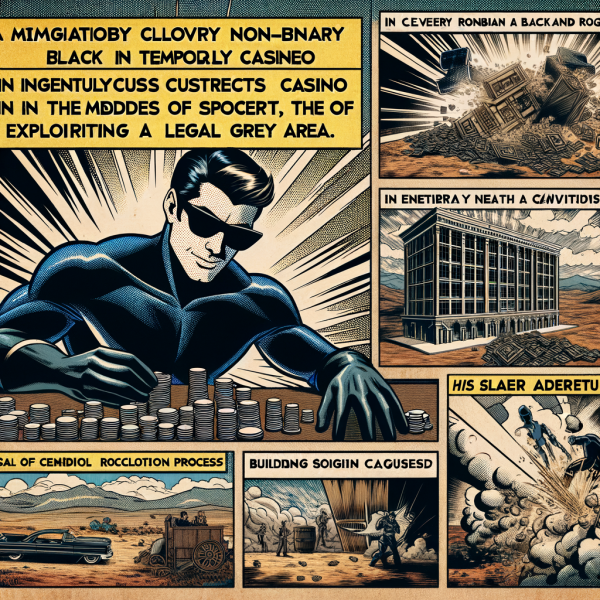The Unconventional Journey of a Casino Entrepreneur
In an age where traditional business models are continually challenged, the story of a man who constructed a casino primarily to win a lawsuit captures the imagination and raises important questions about entrepreneurship and ethics. This individual, let’s call him John Doe, took an unconventional route in the gaming industry, driven not by the allure of profit but by the potential of legal strategy. His journey encapsulates the intersection of law, business, and personal ambition, marking a notable case in the annals of entrepreneurial ventures.
John’s background was far from typical for a casino owner. With a history in finance and a keen awareness of the legal landscape, he identified a unique opportunity where others saw obstacles. Rather than viewing a lawsuit as a mere inconvenience, he ingeniously transformed it into a launching pad for a lucrative enterprise. By building a casino, he aimed not only to generate income but also to create leverage against a legal challenge that had the potential to derail his financial future.
The construction of the casino was no small feat. Doe enlisted architects and consultants, understanding that the physical structure would have to symbolize not just a business endeavor but also a response to the lawsuit he faced. The choice of location, design, and amenities were all meticulously planned to ensure that the casino would attract patrons and generate substantial revenue. In essence, Doe was turning a courtroom battle into a boardroom triumph, demonstrating the adaptability of entrepreneurial spirit.
However, this unconventional journey begs the question: what does it mean for the broader landscape of business? Is it a stroke of genius or a reckless gamble? The complexities surrounding Doe’s motivations, choices, and the ensuing consequences reveal the intricate dance between innovation and legality in modern entrepreneurship.
Legal Battles: The Motivation Behind the Casino Project
The legal battles that prompted John Doe to construct his casino were deeply rooted in a dispute over intellectual property rights. Facing substantial financial claims from a rival who accused him of infringing upon their gaming technology, Doe saw the stakes rising higher than the towers of his future casino. Rather than succumbing to the pressure, he sought a way to counteract these claims through a strategic business move.
By building a casino, Doe aimed to create a multi-faceted defense strategy. On one hand, the casino would serve as a financial resource to cover legal fees and settlements; on the other, it would provide a platform to demonstrate his commitment to the gaming industry. He believed that a successful casino could potentially shift the narrative in court, portraying him as a legitimate entrepreneur rather than a mere defendant.
Doe’s legal counsel endorsed this strategy, arguing that the financial success of the casino might influence the court’s perception of his business practices. In legal disputes, narrative and context often hold significant weight, and Doe’s team aimed to craft a compelling story that would resonate both with jurors and judges alike. Building a thriving enterprise was not just about profits; it was about changing the conversation surrounding his legal issues.
In this way, Doe’s motivations were multi-layered. The construction of the casino was not merely a ploy to win a lawsuit, but a calculated gamble that reflected his resilience and innovative thinking. The legal implications of his actions raised important questions about the use of business ventures as a means of navigating complex legal waters.
Financial Implications: Cost vs. Potential Gains Explained
Understanding the financial implications of building a casino to win a lawsuit requires a nuanced examination of costs versus potential gains. The initial investment required for such an enterprise is colossal, with estimates for a mid-sized casino ranging anywhere from $10 million to $50 million. This includes real estate, construction, licensing, and operational costs. For John Doe, this financial burden was a calculated risk, one he believed would yield returns far beyond mere monetary gain.
In the short term, the financial outlay could seem daunting. However, Doe anticipated that the casino’s operational revenue would not only cover these costs but also generate substantial profit over time. The tourism industry appears resilient, and with strategic marketing, the casino could become a regional attraction, drawing both locals and tourists. This influx of customers would enhance cash flow, thereby providing Doe with the financial means to address his legal challenges.
Moreover, the value of the casino itself could appreciate, serving as an asset that could be leveraged in various ways, including securing loans or attracting investors. The potential gains from this venture were not purely based on the immediate profits from gaming; they also encompassed the long-term financial stability that could arise from owning a successful business.
However, the unpredictable nature of legal battles means that the financial implications are fraught with uncertainty. Should the lawsuit not resolve in Doe’s favor, he could find himself in a precarious position, with a financial burden far heavier than anticipated. This risk underscores the delicate balance that entrepreneurs must navigate when using business ventures as a means to tackle legal challenges.
| Cost Category | Estimated Cost Range |
|---|---|
| Real Estate Acquisition | $2 million – $10 million |
| Construction & Design | $5 million – $20 million |
| Licensing & Regulations | $1 million – $5 million |
| Operational Costs (annual) | $2 million – $10 million |
Ethical Considerations in Using Casinos for Legal Leverage
The ethical considerations surrounding the construction of a casino as a strategic maneuver in a legal battle cannot be overlooked. Critics argue that turning a legal dispute into a commercial project trivializes the judicial process, suggesting that wealth can sway the scales of justice. This raises fundamental questions about fairness and equity in legal proceedings, particularly in cases where one party might leverage financial resources to influence outcomes.
Furthermore, the ethical implications extend to the broader societal impact of promoting gambling as a solution to legal woes. Critics contend that this might inadvertently perpetuate the normalization of gambling as a business strategy, leading to potential societal harm. Excessive gambling can lead to addiction and financial ruin for individuals and families, which raises moral questions about the responsibilities of business owners in promoting such enterprises.
On the flip side, proponents argue that entrepreneurship is fundamentally about risk-taking and innovation. By building a casino, Doe could be seen as engaging in a lawful business practice that also has the potential to create jobs, stimulate the local economy, and contribute tax revenues. They contend that as long as he adheres to legal and ethical standards, his actions should be viewed through the lens of entrepreneurial freedom rather than moral ambiguity.
Ultimately, the ethical considerations surrounding Doe’s casino venture highlight a complex intersection of legality, morality, and business acumen. The boundaries of ethical entrepreneurship are continually being tested, and Doe’s actions serve as a contemporary case study in navigating these waters.
Public Perception: How Society Views This Legal Maneuver
Public perception of John Doe’s decision to build a casino primarily as a strategy to win a lawsuit is multifaceted and varies across different demographics. For some, the move is viewed as a brilliant example of entrepreneurial ingenuity. In a society that often celebrates innovation and the ability to think outside the box, Doe’s actions may be seen as a testament to the proactive nature of business leadership.
Conversely, there exists a significant portion of the public that views this strategy with skepticism. Many perceive it as an exploitation of the legal system, where financial resources can skew justice in favor of those who can afford to invest in their own legal leverage. This sentiment raises eyebrows and questions about the integrity of the legal process, suggesting that wealth can, indeed, become a tool for manipulating outcomes.
Furthermore, communities located near the casino may have mixed feelings. On one hand, the creation of a casino could lead to job creation and increased economic activity. On the other hand, concerns about gambling addiction and the social implications of increased gambling in the area could lead to public apprehension. This dichotomy illustrates the challenges that arise when a business is perceived as a legal tactic rather than a genuine enterprise.
Ultimately, public perception is a reflection of broader societal values. As debates surrounding the ethics of using business ventures for legal advantage continue, Doe’s casino project will likely be scrutinized not only for its immediate impact but also for the broader message it sends about entrepreneurship in the modern age.
Future Implications: Will This Set a Precedent in Law?
The implications of John Doe’s decision to build a casino as a strategy to win a lawsuit could potentially extend far beyond his individual case. If this approach is deemed successful, it could set a concerning precedent for how businesses navigate legal challenges. Other entrepreneurs may view this as a viable pathway to mitigate legal pressures, which could lead to a proliferation of similar strategies across various industries.
Legal scholars and practitioners are already contemplating the ramifications of such maneuvers, considering whether the intersection of business and legal strategy might require regulatory scrutiny. Should courts recognize the construction of a business as a legitimate defense strategy, it could invite a wave of entrepreneurs to consider similar tactics, leading to an influx of commercial enterprises designed specifically to serve as legal leverage.
Moreover, the precedent could shift how laws are interpreted regarding commercial activities and legal strategies. If courts begin to accept business ventures primarily constructed for legal advantage, the relationship between law and business could see fundamental changes. This could lead to new legal standards that assess the integrity and motivations behind entrepreneurial activities, which could further complicate legal landscapes.
However, it is essential to consider the potential backlash this approach might provoke. As public sentiment shifts, lawmakers may feel compelled to enact regulations that curb such practices, aiming to protect the integrity of the judicial process. The resulting tension between innovation and legal ethics will likely fuel ongoing debates in both legal and business communities for years to come.
Q&A Section
Q1: Why did John Doe build a casino?
A1: John Doe constructed a casino primarily as a strategic move to provide legal leverage in an ongoing lawsuit regarding intellectual property rights, aiming to showcase himself as a legitimate entrepreneur and generate revenue to cover legal costs.
Q2: What are the financial risks associated with building a casino for legal reasons?
A2: The financial risks include substantial initial investment costs, ongoing operational expenses, and the uncertainty of the lawsuit’s outcome, which could leave Doe with significant financial burdens if the venture does not succeed.
Q3: Does this kind of venture raise ethical concerns?
A3: Yes, it raises ethical concerns regarding the potential exploitation of the legal system, the normalization of gambling as a business strategy, and the broader societal impact of promoting gambling.
Q4: How does the public perceive this legal maneuver?
A4: Public perception is divided; some view it as entrepreneurial ingenuity, while others see it as a manipulation of the legal system that could undermine judicial integrity.
Q5: Could this set a legal precedent for future cases?
A5: Yes, if deemed successful, it may set a precedent that encourages other entrepreneurs to use business ventures as strategies in legal challenges, prompting potential changes in legal standards and regulations.




